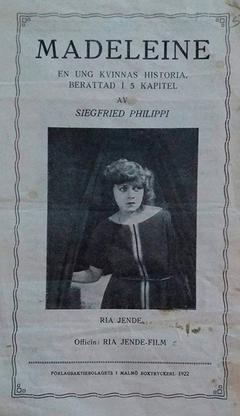Related Research Articles

The Girl with a Hatbox or Moscow That Laughs and Weeps is a 1927 Soviet silent romantic comedy-drama film directed by Boris Barnet and starring Anna Sten, Vladimir Mikhailov and Vladimir Fogel. The picture was commissioned by the People's Commissariat (Narkomfin) to promote government bonds. It was a success with the audiences and the critics alike.

Hermann Vallentin was a German actor.

Three Cuckoo Clocks is a 1926 German silent drama film directed by Lothar Mendes and starring Lillian Hall-Davis, Nina Vanna and Nils Asther. The film's sets were designed by the art director Hans Jacoby. It premiered at the Gloria-Palast in Berlin on 25 May 1926. It was based on a novel by Georg Mühlen-Schulte. Unlike many of Mendes' films from the period, which are now considered lost, it still survives. It was released in the United States by Paramount Pictures under the alternative title of Adventure Mad.

My Heart is a Jazz Band is a 1929 German silent drama film directed by Frederic Zelnik and starring Lya Mara, Raimondo Van Riel and Heinrich Gotho. The film's art direction was by Andrej Andrejew. It premiered on 28 January 1929. It shares its title with a popular 1920s song of the same name.
Ivan Koval-Samborsky was a Ukrainian stage and film actor. After establishing himself in the Soviet film industry in the 1920s, he briefly went to work in Germany during the late 1920s before returning to Russia following the arrival of sound. In 1938 he was arrested by the Soviet authorities, leading to his most recent film, the anti-Nazi The Swamp Soldiers, having to be reshot to minimize his role. He did not appear in another film until 1957.
In the Name of the Kaisers is a 1925 German silent film directed by Robert Dinesen and starring Lya De Putti, Hermann Vallentin, and Jenny Marba.
Mary Lou (German:Mary-Lou) is a 1928 German silent film directed by Frederic Zelnik and starring Lya Mara, Fred Louis Lerch and Ivan Koval-Samborsky.
Mascots is a 1929 German silent film directed by Felix Basch and starring Käthe von Nagy, Jeanne Helbling, and Muriel Angelus.
Sprengbagger 1010 is a 1929 German silent film directed by Carl Ludwig Achaz-Duisberg and starring Heinrich George, Viola Garden and Ivan Koval-Samborsky.

Knights of the Night is a 1928 German silent film directed by Max Reichmann and starring Ivan Koval-Samborsky, Georges Charlia, and La Jana.
Torments of the Night is a 1926 German silent drama film directed by Curtis Bernhardt and starring Claire Rommer, Ernö Verebes and William Dieterle. It was distributed by the German subsidiary of the American company Fox Film.

The Yellow Ticket or Earth in Captivity is a 1928 Soviet silent drama film directed by Fyodor Otsep and starring Anna Sten, Ivan Koval-Samborsky and Mikhail Narokov.

Busy Girls is a 1930 German silent drama film directed by Erich Schönfelder and starring Lien Deyers, Ivan Koval-Samborsky and Elza Temary.

Madeleine is a 1919 German silent film directed by Siegfried Philippi and starring Ria Jende, Eduard von Winterstein and Hermann Vallentin.
Charlotte Corday is a 1919 German silent historical drama film directed by Frederic Zelnik and starring Lya Mara and Hermann Vallentin. No surviving copies are known.
Count Cohn is a 1923 German silent film directed by Carl Boese and starring Hermann Vallentin, Frida Richard and Bernd Aldor.
Hearts Are Trumps is a 1920 German silent film directed by Ewald André Dupont and starring Hermann Vallentin, Hans Mierendorff and Adele Sandrock.
Murder Without Cause is a 1921 German silent crime film directed by E. A. Dupont and starring Hermann Vallentin, Paul Richter and Hanni Weisse.
Darling of the King is a 1924 German silent film directed by Heinz Schall and starring Ruth Weyher, Elisabeth Pinajeff and Bruno Kastner.
The Director General is a 1925 German silent drama film directed by Fritz Wendhausen and starring Albert Bassermann, Hanna Ralph and Alexandra Sorina. The film's sets were designed by the art director Robert Neppach.
References
- ↑ Bergfelder, Carter & Göktürk p.172